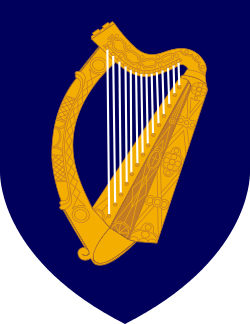Anglo Irish Bank Corporation Act 2009
| Anglo Irish Bank Corporation Act 2009 | |
|---|---|
 | |
| An Act to provide, in the public interest, for maintaining the stability of the financial system in the State, and for that purpose. | |
| Citation | Anglo Irish Bank Corporation Act 2009, Act No. 1 of 21 January 2009 (in English). Retrieved on 12 February 2016. |
| Territorial extent | Republic of Ireland |
| Considered by | Assembly of Ireland |
| Enacted by | Senate of Ireland |
| Date passed | 20 January 2009 |
| Date enacted | 20 January 2009 |
| Date signed | 21 January 2009 |
| Signed by | President Mary McAleese |
| Date effective | 21 January 2009 |
| Introduced by |
Brian Lenihan, Jnr Minister for Finance |
| Status: Current legislation | |
The Anglo Irish Bank Corporation Act 2009 is a piece of emergency legislation composed by the Irish government in January 2009. The Act provides for the emergency nationalisation of Anglo Irish Bank which had been subject to a controversy regarding hidden loans in December 2008. It was voted through Dáil Éireann, being approved by 79 – 67 before passing in Seanad Éireann without a vote on 20 January 2009. President Mary McAleese then signed the Anglo Irish Bank Bill at Áras an Uachtaráin on 21 January 2009.[1] The bank's shares had decreased dramatically on the stock exchange in previous days.[2] At the time of its nationalisation, Anglo Irish Bank had 7,000 loan customers, of whom 5,000 were Irish.[3]
Background
Oireachtas debates
The bill passed through the Oireachtas on 20–21 January 2009.
Dáil debate
The debate in Dáil Éireann lasted five hours and the bill was passed by 79 – 67. Opposition parties Fine Gael and Labour both voted against the legislation, citing a lack of clarity in the Government's proposals. Labour TD Pat Rabbitte regretted that the Dáil did not have the time to debate the matter properly, whilst the party's financial spokesman Joan Burton said there was a failure on the part of the Government to provide any relevant information about the financial situation of the bank.[3] Minister for Finance Brian Lenihan said during the debate that Ireland's two other main banks, Allied Irish Banks (AIB) and Bank of Ireland, would not be nationalised despite they too enduring major falls in their share prices.[4][5] He said the Government would instead stand by to inject up to €2 billion of public money into AIB and Bank of Ireland.[6]
Seanad debate
The bill passed through Seanad Éireann without a vote; however there was a debate on the matter. During the Seanad's debate on the bill, Senator Shane Ross claimed that "no-one was being told the truth about Anglo Irish Bank" and called an Emergency General Meeting of shareholders which had taken place the previous Friday "a disgrace, show[ing] corporate Ireland at its worst, as there were no answers to any questions". Independent Senator Joe O'Toole advocated the chasing of those responsible for the bank's nationalisation "even into the courts", saying that a person could be imprisoned for failure to pay a household bill, yet those who caused the loss of jobs and pensions might not.[7]
References
- ↑ "McAleese signs Anglo Irish Bank Bill". RTÉ. 2009-01-21. Archived from the original on 24 January 2009. Retrieved 2009-01-21.
- ↑ "President signs bill nationalising Anglo Irish Bank". Wicklow People. 2009-01-21. Retrieved 2009-01-21.
- 1 2 "McAleese signs nationalisation bill into law". The Irish Times. 2009-01-21. Retrieved 21 January 2009.
- ↑ "President signs bill nationalising Anglo Irish Bank". Sunday Tribune. 2009-01-21. Retrieved 2009-01-21.
- ↑ "President signs bill nationalising Anglo Irish Bank". Irish Examiner. 2009-01-21. Retrieved 2009-01-21.
- ↑ "Bill to nationalise Anglo Irish Bank signed into law". Irish Independent. 2009-01-21. Retrieved 2009-01-21.
- ↑ "Dáil votes to nationalise Anglo Irish". RTÉ. 2009-01-20. Archived from the original on 3 February 2009. Retrieved 2009-01-21.